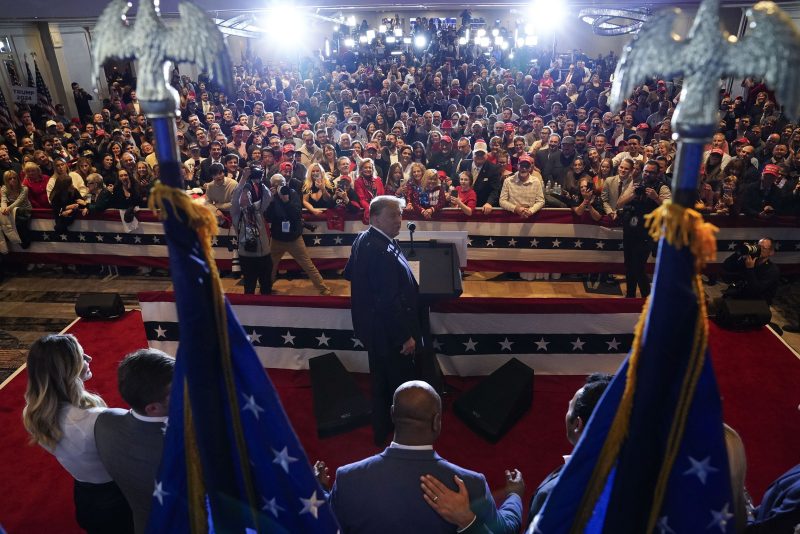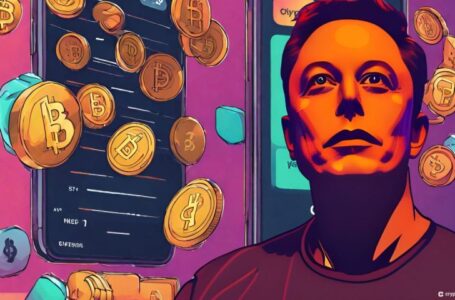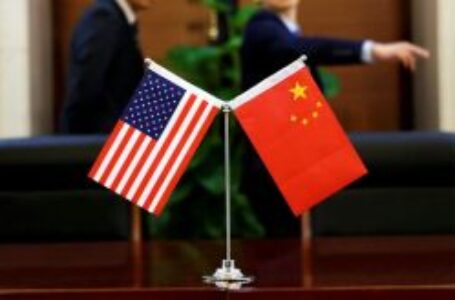Lazarus Group Targets LinkedIn Users, Impersonates Fenbushi Capital Executive: SlowMist
What Donald Trump wants in his next vice president — and who he’s considering


Donald Trump’s perfect vice president looks the part: attractive and telegenic. They are ideally Black or a woman, though that’s not required. And they are most certainly not taller than Trump himself.
Trump wants someone he sees in person but doesn’t see too much, his advisers say. He does not necessarily want a successor as the leader of the MAGA movement; he would prefer that the Republican Party duke it out for his endorsement in four years, one adviser said. He wants a No. 2 who has won in the past. And he wants someone who will never contradict his false claims about the outcome of the 2020 election.
But more than anything, he wants someone who can help him win.
At least a dozen people are under consideration for the job, one top Trump adviser told The Washington Post. That list is “growing, not shrinking,” and Trump keeps adding names, said the adviser, who, like others interviewed for this article, spoke on the condition of anonymity to detail private conversations.
Who is in and out depends on the day. Trump has fixated in some conversations on J.D. Vance, four people close to the campaign say. Trump’s allies have also discussed Republican Govs. Doug Burgum of North Dakota, Kristi L. Noem of South Dakota and Sarah Huckabee Sanders of Arkansas; Sens. Katie Boyd Britt (R-Ala.), Bill Hagerty (R-Tenn.) — who several allies have been quick to note “looks the part” — Marco Rubio (R-Fla.) and Tim Scott (R-S.C.); Reps. Byron Donalds (R-Fla.) and Elise Stefanik (R-N.Y.); and Kari Lake, a MAGA star who lost Arizona’s gubernatorial race in 2022.
Trump has even floated Robert F. Kennedy Jr.’s name to guests on the patio at Mar-a-Lago, although his advisers decry that idea. He could may still pick a political newcomer — perhaps someone from the business world.
He certainly won’t pick Mike Pence.
But Trump is nowhere near making up his mind, and seems in no hurry to do so, according to five people close to him. He watches TV and judges potential candidates carefully — not only what they say, but also their body language and whether they seem confident and convincing.
“Where is my Cary Grant?” Trump repeatedly asks.
He has met with vice-presidential aspirants at Mar-a-Lago and pitted them against one another. After speaking to some of the country’s wealthiest Republican donors on Saturday night, Trump surprised his guests by introducing Burgum, Scott and investor Vivek Ramaswamy, and offering each of them the opportunity to speak.
Holding a semipublic competition to determine his vice president — and waiting until the last minute to make his choice — will play to the former president’s advantage, Trump adviser Jason Miller has argued. All the would-be candidates will work hard for Trump, and Trump and his team will have more time to assess their strengths and weaknesses, Miller has told others in Trump’s orbit.
Knowing Trump likes reality TV, Miller has suggested the campaign build suspense and drama around his selection.
“This is ‘The Apprentice: 2024 version,’” said Terry Sullivan, a Republican consultant who managed Rubio’s 2016 presidential bid. “Donald Trump is nothing if not a showman, and he loves this process and he’s going to drag it out and get as much media coverage and goodwill and leverage it as much as humanly possible.”
In a statement, Trump campaign spokesperson Karoline Leavitt said that “anyone claiming to know who or when President Trump will choose his VP is lying, unless the person is named Donald J. Trump.”
Trump’s vice-presidential pick will be one of his most important decisions ahead of the November election. Most voters already have strong views about Trump, and he has suggested that his choice of running mate “won’t have any impact at all.”
But he is 77, and if he wins, he would be the oldest president inaugurated. Under the Constitution, he can serve only one more term, making whomever he chooses a favorite to succeed him as the leader of the MAGA movement.
Yet becoming Trump’s running mate has proved to be a high-reward, high-risk endeavor. Pence served Trump loyally for four years — to the point of obsequiousness — before Trump turned on him over his refusal to overturn the 2020 election results. The Jan. 6 attack on the U.S. Capitol endangered Pence and his family, as some rioters chanted “Hang Mike Pence.”
Pence launched his own presidential bid last year, saying Trump was no longer qualified for the presidency after Jan. 6, and has pointedly refused to endorse him.
Asked whether being Trump’s vice president carries political risk, Pence adviser Marc Short replied: “That question answers itself.”
“In 2016 our party was very divided, and I think that choosing Pence gave assurance to many conservatives about Trump’s candidacy,” Short said. “I don’t think Trump needs a VP pick to consolidate the party. He has consolidated the party. I don’t think he needs somebody in the same way to navigate Washington because he’s very comfortable communicating in various ways with elected Republicans … I’m not sure that the role would be the same the second time around.”
Chris Christie, who was runner-up to become Trump’s running mate in 2016, expects Trump to drag the process out but eventually select a yes-man.
“Job number one is a sycophant,” Christie said. “Job number two is whatever he believes is the best political advantage on the day he makes the decision. Not the day before, not the day after.”
Christie said that in 2016, Trump was worried about securing the support of evangelical voters and rock-ribbed conservatives. This time, he is more concerned about his own future, Christie said, and finding someone who won’t defy him.
Trump has praised recent television appearances by Rubio and Sanders, who was once his White House press secretary. Rubio has generated significant interest among Trump’s advisers.
The former president has polled advisers, donors and even Mar-a-Lago Club members on Noem but has also questioned whether she has too much “baggage.” Some of his closest advisers were put off recently when she appeared to film an infomercial-style video for a Texas dental clinic that fixed her teeth.
The Noem team has provided the Trump campaign with data that shows she outperforms other potential vice-presidential candidates in the battleground states, according to a person familiar with the discussions. Ian Fury, a spokesperson for Noem, said she had a “fantastic conversation” with Trump last week.
“While the media frets over the VP pick — she’s focused on continuing to deliver wins for the people of South Dakota and doing anything she can to help Trump get reelected,” Fury said.
A knock against Lake, who is running for a U.S. Senate seat in Arizona, is that she did not win her 2022 gubernatorial race, according to three Trump advisers.
“I think he’s genuinely conflicted on several ideas,” Sen. Lindsey Graham (R-S.C.) said. “He’ll mention a few names, but he’s more thinking about: Can you be president, and can you help me.”
Vice-presidential aspirants are auditioning not only during visits at Mar-a-Lago, but also in appearances at fundraisers and on the campaign trail, and on cable news. Several have posted about Trump or emailed about him dozens of times this year, incorporating his name in their messaging.
Trump advisers said almost every candidate named in this article has visited Mar-a-Lago at least once in recent weeks.
In interviews, people close to the potential contenders hinted at striking a balance between aggressively defending Trump, while also not appearing too eager, and often pointed to rivals as counterexamples.
A person close to Sanders said she is in her dream job but noted she’s already vetted and stressed her loyalty to Trump. (Trump advisers said he was hurt that Sanders didn’t endorse him until a November rally in Hialeah, Fa.). A person close to Vance said, “Everything he’s doing right now to help Trump he would be doing whether he was mentioned as a possibility for VP.” (Trump endorsed Vance in the 2022 Senate Republican primary in Ohio, clearing his path to the nomination.)
Scott, who launched a White House bid last year but dropped out in November and is the only Black Republican in the Senate, has made dozens of cable news appearances on behalf of Trump since he endorsed the former president ahead of the New Hampshire primary. Trump has stated both privately and in public that Scott did a better job advocating for him than he did for his own failed White House bid.
Sen. Kevin Cramer (R-N.D.), who met with Trump recently and has encouraged him to pick Scott, said the former president isn’t offering any hints.
“He can be very transparent,” Cramer said. “But if it’s a secret he wants to keep, he’s really good at keeping them. And this is not one where he’s tipped at all.”
If 2016 is any indication, Trump will wait until the last minute to make a decision. Christie, who was the runner-up for the job, said he did not know until the final days that Trump would not be giving him the nod. He received the news in a particularly jarring fashion, when he was alerted by the head of his security detail that Pence was flying into Teterboro, a private airport in New Jersey, he said.
He called Trump, who denied making a final decision. Trump told him to immediately turn on Fox News, where he called into Greta Van Susteren’s show at the time.
“Within, like, 30 seconds, Greta says, ‘We have a special guest calling in by phone. It’s the soon-to-be Republican nominee, Donald J. Trump. Mr. Trump thank you for coming on,’” Christie recalled. “He basically says, ‘I’m down to Christie and Pence, and I hadn’t made any final decision, no matter what anyone tells you.’ And he calls me back. ‘You see? I haven’t made a choice.’”
Christie said he told Trump he didn’t believe him because Pence would not fly from Indiana to New Jersey to lose the faceoff. The next morning, Trump called him to say he was picking Pence.
“He said to me, Chris, look, you’ve got to admit, Pence is right out of central casting,” Christie said.
Isaac Arnsdorf, Leigh Ann Caldwell and Jeremy Merrill contributed to this report.











